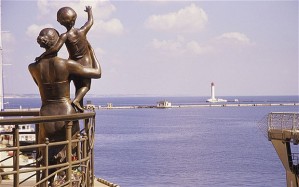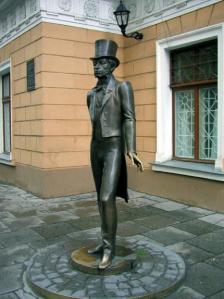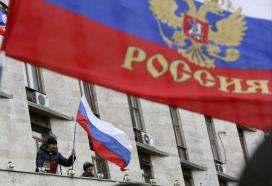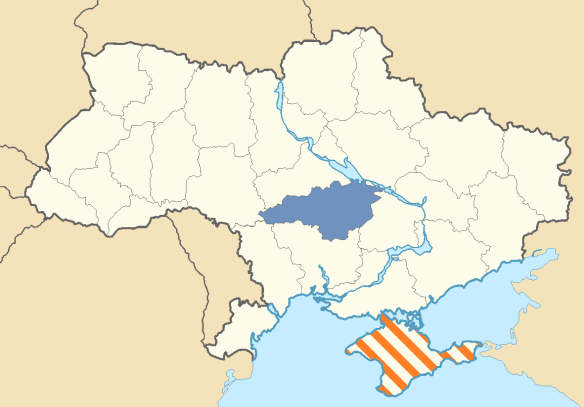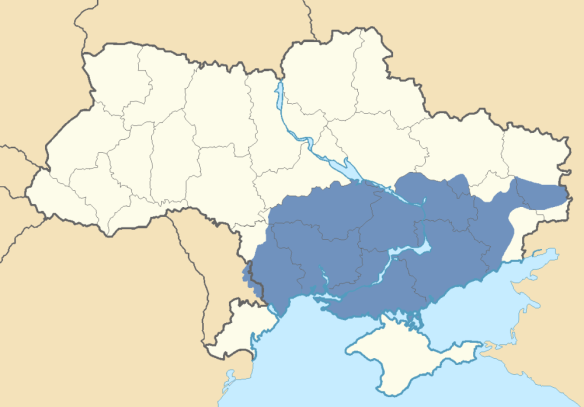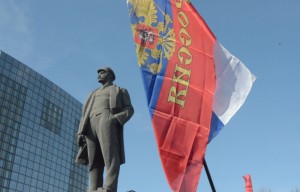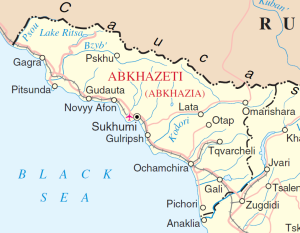
UN Map of Abkhazia, 2014
As the attention of the world was fixed on the violence, unrest, and uncertainty in Ukraine, a revolution erupted in another former Soviet territory. This was the self-proclaimed republic of Abkhazia, a subtropical breakaway territory of post-Soviet Georgia located along the Black Sea coast. However, in order to fully understand what is happening in Abkhazia now, a brief background of the region is required.
What is Abkhazia?

Mural of Bagrat II of Abkhazia from the Gelati Monastery in Imereti, Georgia
An autonomous republic of Georgia in Soviet times, Abkhazia is the home of the Abkhaz, a people who speak a Northwestern Caucasian language that is unrelated to Georgian but more closely related to the language of the Adyghe people, better known to the English-speaking world as Circassians. At the same time, the Abkhaz have a long historical relationship with the Georgians. Though linguistically distinct, Abkhazia was part of the old West Georgian Kingdoms of Colchis and Lazica. Further, the celebrated King Bagrat II of Abkhazia (himself of mixed Abkhaz and Georgian ancestry) unified Georgia as a single, feudal state in the Middle Ages. Consequently, as a people, the Abkhaz have a mixed cultural heritage, incorporating Circassian and Georgian influences as well as Russian, Byzantine, and Turkish ones – and also elements that are uniquely “Abkhaz.” Like the Georgians, the Abkhaz are renowned for their polyphonic singing. In terms of religion, most Abkhaz are Orthodox Christians with significant Muslim and pagan minorities (though pagan traditions generally persist among all Abkhaz).
The Abkhaz-Georgian relationship is complex. In the 19th century, several Abkhaz perceived to be sympathetic to the Ottoman Sultan were deported, along with almost all of their Adyghe neighbors, to the Ottoman Empire by Imperial Russia. Though many Abkhaz remained in Abkhazia, members of other ethnicities moved into their territory as well. These included Russians, Germans, Baltic peoples, Armenians, and Greeks. They also included Mingrelians, a subgroup of Georgians. Many of these Mingrelians were peasants who sought to find free land that was unavailable in their own historic region of Mingrelia.

Nestor Lakoba and his wife Sariya. Both were victims of Stalin and Beria’s Terror in the 1930s.
By the early 20th century, Abkhazia was a distinctly heterogeneous region. Abkhaz comprised roughly the same proportion or a slightly higher proportion of the population to Georgians, with other ethnicities forming the remainder of the population. During Sovietization, Abkhazia was made a contractual, co-equal republic affiliated with Soviet Georgia. However, the territory’s status changed when it was downgraded in the 1930s from being a co-equal region within Georgia, to an autonomous republic of Georgia. Nevertheless, its leader Nestor Lakoba enjoyed popular support from the local population. Abkhaz and Georgians within the republic generally got along well with one another. In fact, Lakoba’s own wife Sariya was a beautiful ethnic Georgian woman from Batumi.
However, Lavrentiy Beria, the leader of Soviet Georgia and of Soviet Transcaucasia despised Lakoba. Born to a Mingrelian family in Abkhazia, Beria viewed Lakoba as a rival for influence with Stalin especially because Stalin seemed to favor Lakoba. The rivalry is perhaps best illustrated in the glasnost-era film Belshazzar’s Feasts, or A Night with Stalin based on a story from the novel Sandro of Chegem by the celebrated Russian-language Abkhaz writer Fazil Iskander. The enmity did not end well for Lakoba or Abkhazia. He was assassinated by Beria in 1936. Shortly afterward, he was declared an “enemy of the people” and his family was persecuted. Beria then flooded Abkhazia with large numbers of ethnic Mingrelian settlers and encouraged the invention of a false academic discourse claiming that the Abkhaz were not indigenous to Abkhazia, but “new arrivals.” By the 1950s, the Abkhaz were reduced to only 15% of the population in their own homeland.

Beautiful Gagra on the Black Sea Coast (Panoramio)
After Stalin’s death, the Abkhaz began to experience an era of limited freedom. Abkhaz-language publishing returned and the Abkhaz representation in Abkhazia increased. Gradually, the Abkhaz portion of the population was beginning to bounce back as well. The situation in the republic remained largely peaceful. Abkhazia was known throughout the Soviet Union as a popular and prosperous holiday destination. Gagra, Sukhumi, Pitsunda, and other coastal cities became highlights of the Soviet Black Sea Riviera. Its citrus trees, spas, and the famous Sukhumi botanical garden became legendary throughout the Soviet Union. Politics meant little to vacationers on Abkhazia’s inviting Black Sea coast. The republic’s diverse ethnic groups generally lived in peace with one another.
However, ethnic tension arose with the start of glasnost. Some Abkhaz nationalists demanded to elevate their territory to the status of a full union republic while Georgian nationalist dissidents, led by the eccentric Zviad Gamsakhurdia (also a Mingrelian) began to encourage a chauvinistic discourse of a “Georgia for the Georgians.” They claimed that Abkhaz, Ossetians, and others were “new arrivals” in Georgia and consequently alienated them. Clashes erupted between Abkhaz and Georgians in Sukhumi in 1989. Yet despite the violence and the rival nationalisms, Gamsakhurdia reached a compromise with the Abkhaz in a power-sharing agreement. Thus, as ethnic tension engulfed South Ossetia and civil war in Georgia proper erupted over Gamsakhurdia’s nationalist discourse and authoritarian rule, Abkhazia remained relatively peaceful. Notably, the Abkhaz leadership expressed the desire for their republic to become a full co-equal republic within a federated Georgia, an offer that was rejected by Tbilisi.
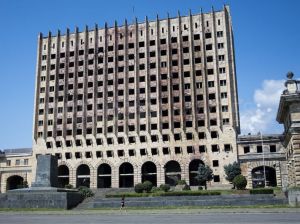
The Council of Ministers Building of Abkhazia, still damaged from the 1992-93 Abkhaz-Georgian war (RFE/RL)
In December 1991, the rouge general Tengiz Kitovani led a coup against Gamsakhurdia that deposed the controversial nationalist president. After Gamsakhurdia was ousted from power, the more moderate Soviet-era Georgian leader and former Soviet Foreign Minister Eduard Shevardnadze was invited to return to Tbilisi as Georgia’s new President. Undeterred, Gamsakhurdia fled to his home region of Mingrelia where the “Zviadists” launched a revolt against the new government in Tbilisi. Acting on his own accord, Kitovani invaded Mingrelia and then pressed on to Abkhazia, claiming that Gamsakhurdia’s supporters were sabotaging the Abkhazian railway. In reality, Kitovani was moving to bring the Abkhaz firmly under Tbilisi’s rule. His operation resulted in a full-fledged and violent war in Abkhazia with atrocities committed by all sides. The Abkhaz side was assisted by rouge Russian nationalists (though not the Russian government) and by militants from the North Caucasus like the notorious Shamil Basayev. By the end of the war, much of Abkhazia’s Georgian population either fled or was expelled. Many still live as IDPs in Georgia today, though a sizable number have returned, notably to the southern Gali district.
Post-war Abkhazia and lost alternatives toward peace
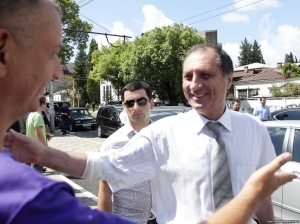
Abkhazia’s Sergey Shamba (RFE/RL)
Peace talks subsequently ensued, often with Yeltsin’s Russia leading the way in the negotiations. Several proposals existed in the 1990s to create a common Georgian-Abkhaz federal or confederal state structure. The Abkhaz side claims that they accepted such proposals, but that they were rejected by Shevardnadze who wanted to retain a unitary Georgian state with an autonomous Abkhazia. The Abkhaz refused this and talks ultimately fell through. However, a renewed effort toward peace began after the 2003 Rose Revolution in Georgia. Mikheil Saakashvili’s new envoy to the disputed territories was Irakli Alasania (now Defense Minister of Georgia). Born to a Mingrelian family, Alasania was able to forge very good working relations and friendship with the Abkhaz. He invited the Abkhaz Foreign Minister Sergey Shamba to Tbilisi, a request with which Shamba accepted with pleasure. The visit was by all accounts a success, except for the fact that President Saakashvili refused to meet with Shamba. Instead, confident that he had the full backing of the United States and NATO, Saakashvili planned (according to many Georgian observers) to retake Abkhazia and Georgia’s other breakaway region, South Ossetia, by force. On the day of Shamba’s Tbilisi visit, Saakashvili was on the Georgian-Abkhaz frontier making military preparations.
Yet Alasania was undeterred. With Shamba he agreed to sign a non-use-of-force agreement as a confidence-building measure with the Abkhaz. This would have taken place in Sochi under the auspices of then-Russian President Dmitri Medvedev. It would have been a serious alternative leading to a de-escalation in tensions not only between Tbilisi and Sukhumi, but also Tbilisi and Moscow as well. However, Saakashvili refused to permit the meeting to take place. Instead, according to Nino Burjanadze and others, Saakashvili continued preparations for war on the two territories, and brazenly informed Russia’s Vladimir Putin about it. Putin warned Saakashvili that invading either of the two territories would result in a Russian intervention and a formal recognition of their independence. But Saakashvili dismissed this. The result was the August 2008 war in which Saakashvili’s Georgia lost. Both Abkhazia and South Ossetia were recognized by Russia. Any sort of peace or reconciliation now seemed more distant than ever.

Georgian Billionaire Bidzina Ivanishvili (VOA)
A renewed chance for peace?
In October 2012, Mikheil Saakashvili’s party, the United National Movement lost parliamentary elections to the Georgian Dream coalition, led by the Imeretian billionaire Bidzina Ivanishvili. Unlike Saakashvili and his party who were unequivocally pro-Western, Ivanishvili and his party can be best described as neither pro-Western, nor pro-Russian, but pro-Georgian. While Ivanishvili has spoken of the historical importance of joining the EU, he has, at the same time, not completely ruled out joining the Moscow-backed Eurasian Union either. The party’s control on power increased following Saakashvili’s loss of the Georgian presidency to the bon-vivant philosopher-turned-politician Giorgi Margvelashvili. Then, Ivanishvili himself stepped down as Prime Minister, appointing Irakli Garibashvili as his successor.
One of the cornerstones of the new Georgian government’s foreign policy is reunification with Abkhazia and South Ossetia, even more so perhaps than membership in the EU and NATO. Evidence of this is the fact that the Ivanishvili government is filled with people who have good working relations with the Abkhaz and Ossetians who understand fundamentally the ethnic concerns of both groups. These include individuals like Alasania, Guram Odisharia, and Paata Zakareishvili. Many were featured in the documentary, Absence of Will, a must-see film for anyone wanting to get a true understanding of the Abkhaz-Georgian conflict. Indeed, the present Georgian Dream government can truly be described as the first post-Soviet Georgian government that really understands Abkhazia and South Ossetia.
Ivanishvili has kept both the EU and NATO on the table, likely as bargaining chips with Moscow to regain the two breakaway regions. However, the sentiments of the Abkhaz and the Ossetes have to be taken into consideration as well, and Russia will not simply “reverse” its recognition of these two regions. Rather, it may work to promote a “reunification” of these regions with Georgia proper into a co-equal federation or confederation (though Tbilisi would be more accepting of the former than the latter). This would be a logical resolution to the issue and it would certainly help Moscow both geopolitically and domestically with the Georgian public (the Georgian Dream would receive the credit for reunifying the country, not Saakashvili). I have written about such a resolution in the past and others, including Dmitri Trenin of the Moscow Carnegie Center, have done so as well.
What is happening in Abkhazia now?
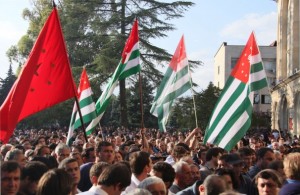
Protests in Sukhumi (AFP / Getty Images / Ibragim Chkaduaibragim Chkadua)
Since last Tuesday, there have been massive protests in Sukhumi against the Abkhaz President Aleksandr Ankvab. The opposition has accused the leader of authoritarian tendencies and of misspending funds by Russia. On Saturday, the Abkhaz parliament relieved Ankvab of his presidential duties. He resigned the next day. Snap elections have been called for August 24.
What is happening now in Abkhazia is either:
A) Genuine discontent and frustration with the Ankvab government by the people of Abkhazia and by the political opposition, or,
B) Moscow covertly working through the opposition in Abkhazia to unseat Ankvab and to bring to power a government more compliant to Moscow that would be more willing to compromise with Georgia. This is possible given the sheer timing and speed with which the events have been proceeding (kind of like Crimea) since last Tuesday.
Both are reasonable explanations for the present situation.
However, it must also be noted that the Abkhaz opposition is a diverse group. One of its leaders Raul Khajimba is a hardline nationalist and former KGB agent who has categorically ruled out any compromise with Georgia, let alone granting ethnic Georgians in Abkhazia Abkhaz citizenship. Another, Sergei Shamba is the man who both led the peace negotiations with Abkhazia in the 1990s and forged a good working relationship with Georgia’s Irakli Alasania. If anyone in Abkhazia can find a compromise solution to the problem, it would be Shamba.

Former Abkhaz President Aleksandr Ankvab (RIA Novosti / Vladimir Popov)
The most interesting development is the sudden request by the Abkhaz opposition to join Moscow’s Eurasian Union. Prior to this, the idea of joining the Eurasian Union never figured in Abkhaz politics much at all. The rapidity of such a request, and the fact that it has appeared almost coincidentally with the signing of the Eurasian Union deal between Moscow, Astana, and Minsk, also makes one wonder whether or not Moscow is involved. This may be intended to further illustrate to Tbilisi that it risks being permanently separated from Abkhazia if it joins the EU and NATO. On the other hand, if this request emerged from the genuine sentiments of the Abkhaz opposition, it could be in response to the Georgian Defense Minister Alasania’s statements calling for NATO bases in Georgia, which Abkhaz politicians of all political strands oppose. Such statements may have been made by the traditionally more moderate Alasania to call Moscow’s bluff. Likewise the request to join the Eurasian Union could also be a combination of both factors (i.e., Moscow’s involvement and concerns of the Abkhaz regarding Georgian NATO membership).
In the meantime, it will be interesting to see how Moscow responds to the demand of the Abkhaz opposition to join the Eurasian Union. Will they welcome them with open arms, or will they shuffle their feet? My guess is the latter, not only because Moscow still wants to have a card on the table to lure back Tbilisi, but also because the other two founding members of the Eurasian club, Belarus and Kazakhstan, do not recognize Abkhazia’s independence. Minsk and Astana would need to recognize Abkhazia’s independence before supporting Sukhumi’s membership in the Eurasian Union, which they will likely not do because they have their own geopolitical priorities (especially Nazarbayev with his traditionally balanced foreign policy). All of this adds credence to the scenario that Moscow is involved in the present revolution in Abkhazia because, under the present geopolitical circumstances, Abkhazia can never fully join the Eurasian Union without Georgia largely due to the position of Minsk and Astana. Hence, the ouster of Ankvab may very well be step one to a detente between Tbilisi, Sukhumi, and Moscow.
It should likewise be noted that Moscow does not need to do this in South Ossetia because it already has a government in Tskhinvali that is now more or less under its control. To illustrate this, it should be recalled that the former interim South Ossetian President Vadim Brovtsev was an ethnic Russian businessman from Chelyabinsk with no prior ties to the region.
In any case, one can safely say that unless Moscow, Tbilisi, and Sukhumi resolve their differences, Abkhazia could become another “frontline” in the emerging new Cold War. If this happens, it would make the situation in the Caucasus region much more dangerous and it would ultimately be a negative development for Russian, American, European, Middle Eastern, and international security.


